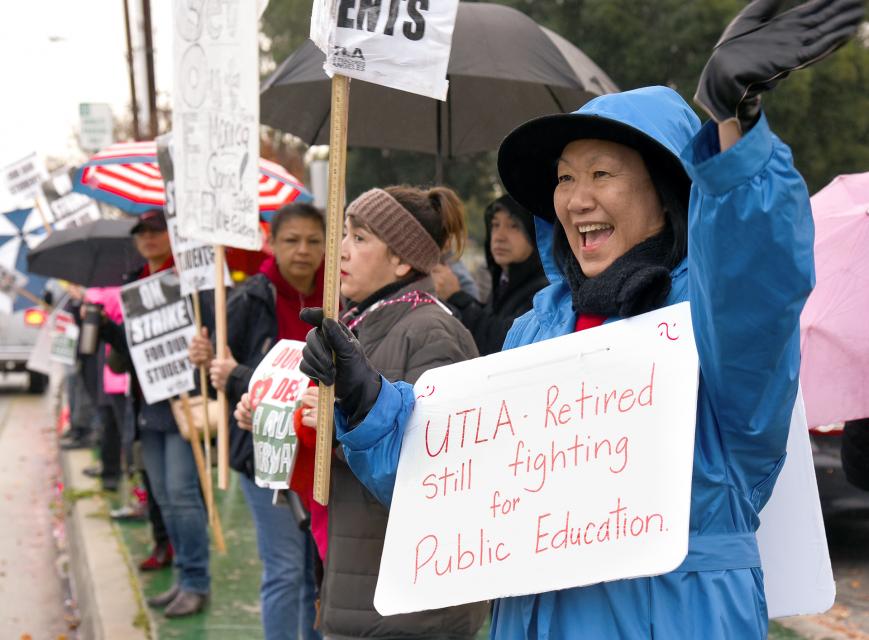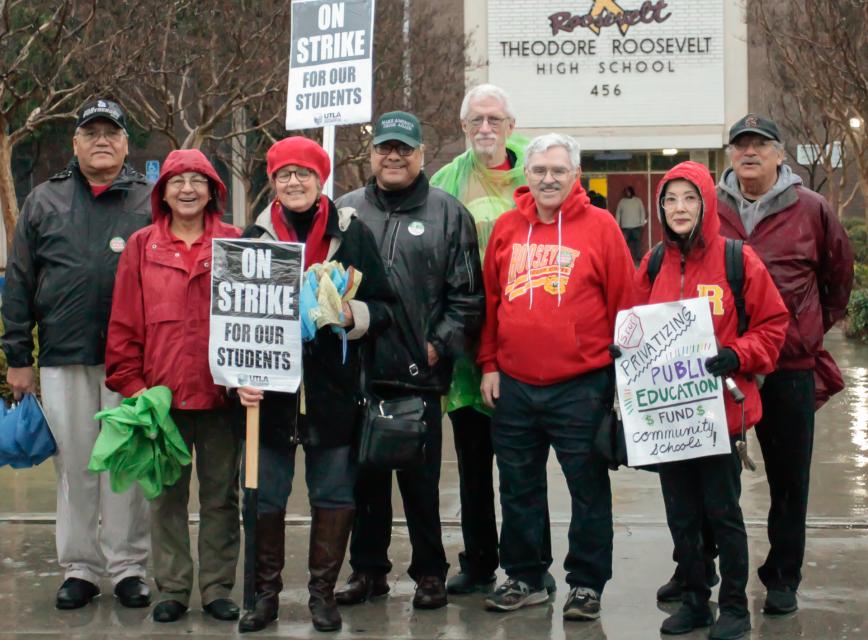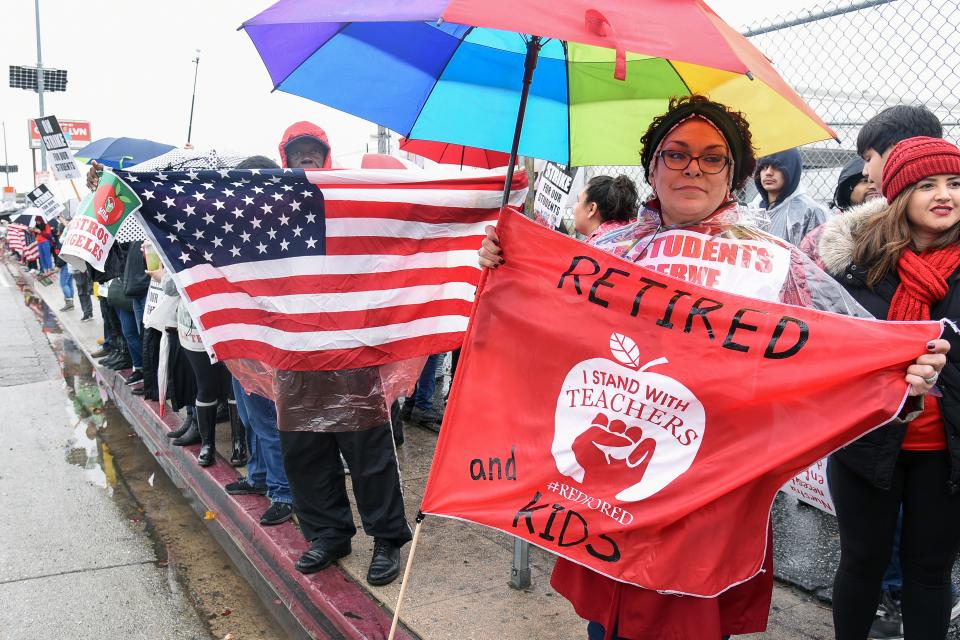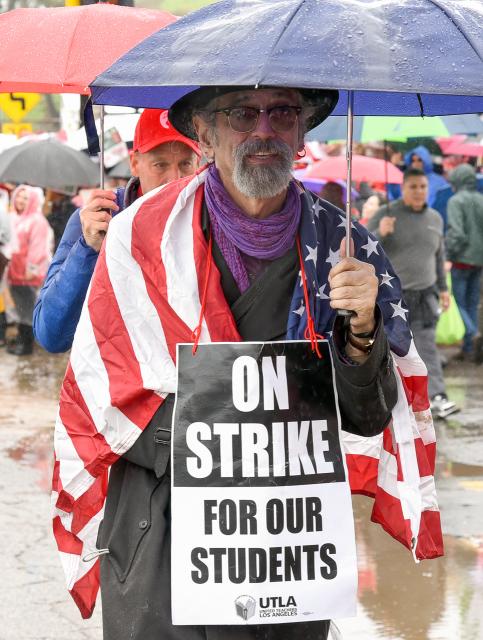During the strike, hundreds of retired L.A. teachers returned to their former schools to continue the fight for public education. One veteran of the two previous strikes said back then UTLA was up against an intransigent district, but didn’t have to face billionaires and unrestrained charter school growth.
UTLA-Retired is now mobilizing all its 4,300 members for the special election in March to fill a key seat on the LAUSD school board and tilt the balance away from a pro-charter majority.
John Perez cut his union teeth when he was 23 years old. It was 1970 and Perez was a probationary teacher at Roosevelt High when a fledgling United Teachers Los Angeles shut down L.A. Unified schools for 23 days.
“I was in my first year at my first job, but I knew what the issues were and what UTLA needed to do, so I did it. I walked out. It wasn’t even a question,” he said.
Perez continued teaching at Roosevelt and rising through UTLA ranks. Members elected him president in 2003 and he currently heads UTLA-Retired as well as CFT’s Council of Retired Members. He and 15 other UTLA-R members walked the line at the iconic East L.A campus on day one.
“I was in my first year at my first job, but I knew what the issues were and what UTLA needed to do, so I did it. I walked out. It wasn’t even a question,” he said.
“Today’s teachers also know what the issues are and what UTLA needed to do, and they did it very well,” he said. “The union movement is in good hands.”
Peter Cuevas was one of Perez’s students during the 1989 strike. He and his nine siblings are all Roosevelt Rough Riders, as was their father in the 1950s.
“There was no doubt that I was going to strike,” said Cuevas, a special education teacher at Roosevelt since 1995. “We love our community, and seeing so many retired teachers come back to picket tells me they care about it as much as we do.”
Perez estimates that more than 500 retired UTLA members took part in the strike. “I saw seniors of every age and physical ability, from agile new retirees bouncing around picket lines to older folks with walkers at the rallies.”
“I am what I am today thanks to UTLA”
UTLA-R Secretary Susie Chow “adopted” Robert Hill Lane Elementary during the strike because it’s close to her home. Chow speaks in the first person when it comes to the union’s history.
“I am what I am today thanks to UTLA,” she said. “I remember my high school social studies teacher going on strike in 1970, and then I became a teacher. I was a newbie during the 1989 strike. I even took my three-year-old on the picket line.”
Picket captain Loribeth Mau said Chow was always the first person to arrive at the line. “I would get there at 7 a.m., and Susie would already be walking up and down with her picket sign.”
I remember my high school social studies teacher going on strike in 1970, and then I became a teacher. I was a newbie during the 1989 strike.
Chow didn’t teach at Robert Hill Lane, but knew Mau before the walkout. She guided Mau through the tough National Board Certification process when she directed the UTLA-led support program.
“It was such an honor to walk with someone who fought for public education all her career,” Mau said, “and is still fighting for justice, even in retirement.”
Fighting for the common good for nearly 50 years
UTLA was fighting for its life in 1970, when only 60 percent of LAUSD teachers walked off the job, but from the beginning the union demanded changes aimed at improving education for the neediest children and giving parents a voice.
“Back then, LAUSD students were 70 percent white and 70 percent middle class,” Perez said, “but we proposed an ‘Inner City Package’ aimed at communities in East and South L.A. and the San Fernando Valley. The demands were very similar to today – more teachers, smaller class sizes, more individual attention.”
The main issue during UTLA’s 9-day strike in 1989 was higher salaries to retain teachers. “Our main non-economic demand was for school-based management to give our members and our students’ parents a say in our schools.”
There are similarities between all three struggles, Perez said, but this strike was more significant because of the context.
“In ‘70 and ‘89, we were only up against intransigent district officials. Eli Broad and charter schools weren’t a factor. Now the privatizers are out in full force to transform public education into a system of private schools with public money.”
Perez gave the Class of 2019 an “A” for mobilizing parents much more effectively than during earlier strikes. Most parents kept their children at home, costing the district tens of millions of dollars daily in lost per-pupil funding from Sacramento.
Back then, LAUSD students were 70 percent white and 70 percent middle class, but we proposed an ‘Inner City Package’ aimed at communities in East and South L.A. and the San Fernando Valley.
UTLA-Retired is a rising political force
UTLA-R now has 4,342 members and as many as 150 retirees attend general assemblies five times per year. Serving with President Perez and Secretary Chow are Vice President Cecilia Boskin and Treasurer Mike Dreebin.
“UTLA teachers learned from our own experience that collective action is the way to protect yourself,” Perez said, “and that doesn’t stop being true when you retire. That’s why we have more than 4,300 members.”
UTLA-R is preparing to mail all members an appeal to join PACE, the union’s Political Action Council of Educators. The ominous headline, “Your Benefits Are at Risk,” refers to changes in retiree health coverage that LAUSD proposed – and UTLA rejected – in the just-concluded negotiations.
The mailing is part of the mobilization for a March 5 special election to replace an LAUSD school board member who pled guilty to felony violations of finance laws and was forced to step down. The board is now split 3-3 between charter advocates and critics. UTLA has endorsed Jackie Goldberg, a longtime progressive, former teacher and assemblymember, who began her career on the school board.4 5 BRJ 4946
“Other districts are going down this road, so you can bet those proposed take-backs will return,” Perez said. “The best way for retirees to defend their benefits is electing Jackie.”
Josh Pechthalt – who is set to retire as CFT president this spring – has his eyes on a later prize. Pechthalt is counting on a “Silver Wave” of retirees to help pass the Schools and Communities First initiative on the November 2020 ballot. The CFT-supported act would generate an estimated $11 billion per year for public education and other services by plugging a loophole in Proposition 13 that has allowed commercial and industrial property owners to avoid tax increases.
“UTLA has the largest retiree chapter, but there are active groups of all sizes up and down the state,” Pechthalt said, referring to the 17 AFT-chartered retiree chapters in California. “These are members who know what to do in a campaign. They don’t need much explaining. They get right down to doing.”
UTLA teachers learned from our own experience that collective action is the way to protect yourself.
A torch has been passed to a new generation of UTLA activists. For Loribeth Mau, the memory remains bright of Robert Hill Lane strikers linking arms with strikers from other Eastside schools to “form a line for blocks and blocks down Cesar Chavez Avenue to show solidarity.”
“It feels fantastic to go back to teaching and being with my children, but I keep thinking of how we can help the Oakland teachers,” Mau said. “I’m becoming an activist with a cause.”
Now multiply Mau’s energy by 33,000 strikers.
— By Steve Weingarten, CFT Reporter




